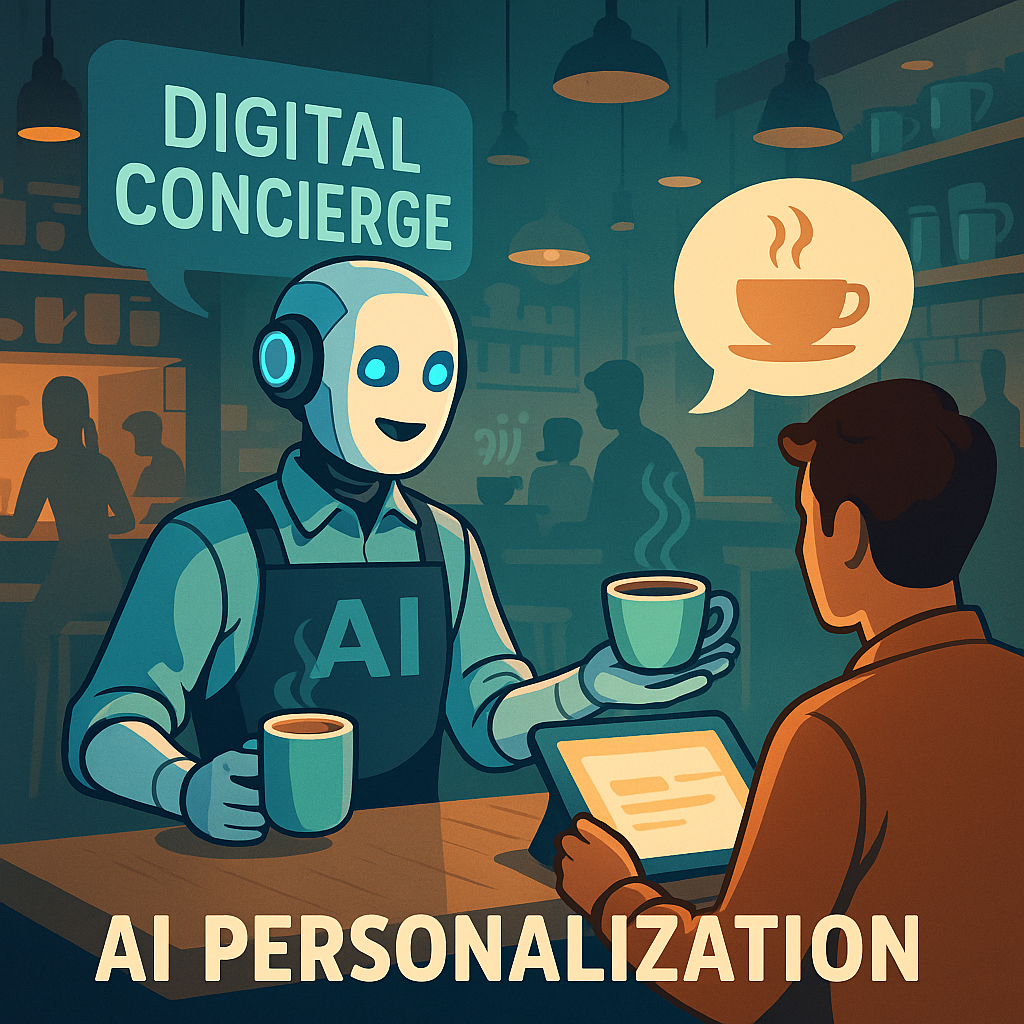Introduction: The AI Revolution in B2B
The B2B landscape is undergoing a seismic shift, and at the heart of it all is the relentless march of Artificial Intelligence. We're not just talking about incremental improvements; we're witnessing a fundamental reshaping of how businesses interact, operate, and compete. Let's dive into how this AI revolution is unfolding in the B2B sector.
Unleashing Operational Efficiency
AI's prowess in automating repetitive tasks is revolutionizing operational efficiency across B2B enterprises. Imagine a world where mundane, time-consuming processes vanish, freeing up valuable human capital for strategic initiatives. Consider supply chain management, for example. AI-powered systems can now predict demand fluctuations with remarkable accuracy, optimizing inventory levels and minimizing waste. This means less capital tied up in storage and fewer missed opportunities due to stockouts. Similarly, in customer service, AI-driven chatbots can handle routine inquiries, providing instant support and resolving common issues without human intervention. This not only reduces operational costs but also enhances customer satisfaction by providing immediate assistance. One compelling example is the use of AI in contract analysis, where tools like Thomson Reuters can quickly sift through complex legal documents, identifying key clauses and potential risks far faster and more accurately than any human lawyer.

AI as the Decision-Making Powerhouse
Beyond automation, AI is rapidly becoming an indispensable tool for improving decision-making in B2B. By analyzing vast datasets and identifying hidden patterns, AI empowers business leaders to make more informed choices. Think of a marketing team trying to optimize their campaigns. AI algorithms can analyze customer data, market trends, and competitor activities to identify the most effective messaging, channels, and targeting strategies. This data-driven approach minimizes guesswork and maximizes the return on investment. Furthermore, AI can help assess risks more effectively. For instance, financial institutions use AI to detect fraudulent transactions, assess creditworthiness, and manage investment portfolios, mitigating potential losses and optimizing financial performance. For professionals wanting to dive deeper into AI for data-driven insights, resources on AI in Practice offer extensive case studies and best practices.
The Competitive Edge: AI-Driven Innovation
In today's cutthroat B2B environment, gaining a competitive advantage is paramount, and AI is emerging as a powerful differentiator. Companies are leveraging AI to develop innovative products and services, personalize customer experiences, and optimize their business models. For example, manufacturers are using AI-powered predictive maintenance to anticipate equipment failures, minimizing downtime and maximizing production efficiency. This proactive approach not only reduces costs but also enhances customer satisfaction by ensuring reliable product delivery. In the realm of sales, AI-driven tools can analyze customer interactions, identify potential leads, and personalize sales pitches, increasing conversion rates and driving revenue growth. The ability to harness AI for innovation is no longer a luxury but a necessity for B2B companies looking to thrive in the digital age. AI tools like Salesforce Platform are at the forefront, offering AI-powered solutions that transform CRM and sales processes.
AI's Central Role in B2B Digital Transformation
Ultimately, AI is not just a standalone technology; it's a catalyst for broader digital transformation in the B2B sector. It's enabling companies to reimagine their business processes, create new value propositions, and build more agile and resilient organizations. By integrating AI into every aspect of their operations, B2B companies can unlock unprecedented levels of efficiency, innovation, and customer centricity. This transformation requires a strategic approach, with companies carefully assessing their needs, identifying the right AI solutions, and investing in the talent and infrastructure needed to support their AI initiatives. Whether it's by exploring resources from our AI News section to remain updated on the latest breakthroughs, or by diving into practical guides from the Learn section, now is the time for B2B businesses to embrace the AI revolution, and transform their business from the inside out. As AI continues to evolve, its impact on the B2B sector will only intensify, making it essential for companies to prioritize AI adoption and harness its transformative power to succeed in the years to come.
Why B2B Companies Need AI Consulting
In today's rapidly evolving business landscape, Artificial Intelligence (AI) is no longer a futuristic concept but a present-day necessity, especially for B2B companies striving to maintain a competitive edge. However, the path to AI adoption isn't always straightforward, making AI consulting an invaluable asset.
Navigating the Digital Transformation Maze in Traditional B2B
Traditional B2B companies often grapple with unique challenges during digital transformation. Unlike B2C businesses that can quickly adapt to new technologies, B2B enterprises frequently face deeply entrenched legacy systems and processes. Imagine a large manufacturing firm that has been using the same ERP system for two decades. Integrating a new AI-driven predictive maintenance tool could be a monumental task, requiring significant overhauls and custom integrations. These challenges can include:
Data Silos: Information is often scattered across various departments and systems, hindering a unified view crucial for effective AI implementation. Think of a sales team using one CRM while the marketing team uses another, making it difficult to get a holistic view of customer behavior.
Legacy Systems: Outdated infrastructure can be incompatible with modern AI solutions, necessitating costly upgrades or workarounds. This is like trying to run a cutting-edge video game on a computer from the early 2000s – it simply won't work without significant upgrades.
Resistance to Change: Employees accustomed to established workflows may resist adopting new AI-driven processes, leading to implementation bottlenecks. It's human nature to stick with what you know, and overcoming this resistance requires careful change management.
Lack of Digital Skills: A workforce lacking the necessary digital skills can struggle to effectively use and manage AI technologies. This is like giving someone a Formula 1 car who has only ever driven a bicycle; they'll need training to get the most out of it.
Decoding the Complexity of AI Technologies
AI is not a monolithic entity; it's a vast and intricate field encompassing various technologies like machine learning, natural language processing, and computer vision. For a B2B company venturing into AI, understanding these nuances is crucial. For example, a company wanting to automate its customer service might explore using Jotform AI Agents to build AI-powered chatbots that can handle customer inquiries efficiently. The complexity arises from:
Algorithm Selection: Choosing the right algorithm for a specific task requires deep expertise. Should you use a decision tree, a neural network, or a support vector machine? The answer depends on the data and the problem you're trying to solve.
Data Requirements: AI models are data-hungry, and ensuring data quality and relevance is paramount. "Garbage in, garbage out" is a common saying in AI, highlighting the importance of clean and representative data.
Ethical Considerations: Implementing AI raises ethical concerns around bias, fairness, and transparency that must be addressed proactively. For example, an AI-powered hiring tool could inadvertently discriminate against certain demographic groups if not carefully designed and monitored.
Integration Challenges: Integrating AI solutions into existing IT infrastructure can be technically challenging and require specialized skills. This is like trying to fit a square peg into a round hole; it requires careful planning and execution.

The Imperative for Expert AI Guidance in B2B
Given the challenges and complexities, B2B companies often find themselves in need of expert guidance. AI consulting firms bring a wealth of knowledge and experience, acting as strategic partners to navigate the AI landscape. They help businesses understand how tools like Google AI Studio, a platform for building and experimenting with AI models, can be leveraged to address their specific needs. The need for guidance stems from:
Objective Assessment: Consultants provide an unbiased evaluation of a company's AI readiness and potential. They can identify areas where AI can deliver the most value, without being swayed by internal biases or preconceived notions.
Strategic Roadmap: Consultants develop a clear and actionable AI strategy aligned with the company's overall business objectives. This roadmap outlines specific projects, timelines, and resource requirements.
Technology Selection: Consultants help select the most appropriate AI technologies and vendors based on the company's unique needs and budget. They can cut through the hype and identify solutions that deliver real results.
Talent Acquisition: Consultants assist in building or augmenting internal AI teams by identifying and recruiting skilled professionals. This ensures that the company has the necessary expertise to implement and manage AI solutions effectively.
The Tangible Benefits of Tailored AI Consulting for B2B Businesses
The benefits of AI consulting extend beyond mere guidance; they translate into tangible improvements in efficiency, profitability, and competitive advantage. These benefits are amplified when consulting is tailored specifically for B2B needs. Using a tool like HubSpot for example, a B2B company can leverage AI to better understand customer behavior and improve sales processes. Consider these advantages:
Increased Efficiency: AI-powered automation streamlines processes, freeing up employees to focus on higher-value tasks. Imagine automating invoice processing, reducing the time and effort required from the finance team.
Enhanced Decision-Making: AI-driven analytics provide insights that enable better-informed decisions. For example, AI can analyze market trends to identify new opportunities or predict customer churn to take proactive retention measures.
Improved Customer Experience: AI-powered personalization enhances customer interactions, leading to increased satisfaction and loyalty. This could involve tailoring product recommendations or providing personalized customer support.
New Revenue Streams: AI can unlock new revenue streams by enabling the development of innovative products and services. For instance, a manufacturing company could use AI to offer predictive maintenance services to its customers.
Aligning AI Strategy with B2B Business Goals
Ultimately, the success of AI adoption hinges on aligning AI strategy with overarching business goals. AI should not be implemented for its own sake; it should be a means to achieving specific, measurable objectives. AI consulting plays a crucial role in ensuring this alignment. For example, a B2B company might use Salesforce Platform and integrate AI to optimize sales processes. Here's how alignment is achieved:
Understanding Business Priorities: Consultants work closely with business leaders to understand their strategic priorities and key challenges. This ensures that AI projects are aligned with the company's most pressing needs.
Defining Clear Objectives: Consultants help define clear and measurable objectives for AI projects. This provides a framework for evaluating success and ensuring that AI investments deliver a return.
Measuring Impact: Consultants establish metrics to track the impact of AI initiatives on key business outcomes. This allows the company to continuously optimize its AI strategy and maximize its value.
Fostering a Data-Driven Culture: Consultants help foster a data-driven culture within the organization, encouraging employees to use data and AI insights to make better decisions. This ensures that AI is integrated into the fabric of the company.
In conclusion, the challenges of digital transformation and the complexity of AI technologies make expert guidance essential for B2B companies. Tailored AI consulting offers tangible benefits, aligning AI strategy with business goals and unlocking new opportunities for growth and innovation. As we move forward, understanding the practical applications of AI in B2B will only become more critical. Let's explore some real-world examples of successful AI implementation in B2B in the next section.
Key Steps in AI Implementation for B2B
Embarking on AI implementation in the B2B world is like navigating uncharted waters – exciting, but requiring a well-defined map. Let's break down the key steps to ensure a successful voyage.
Initial Assessment and Feasibility Study
Before diving headfirst into AI, a thorough initial assessment is crucial. This involves understanding your current business processes, identifying pain points, and determining whether AI can realistically address them. Think of it as a doctor diagnosing a patient before prescribing medication; you need to pinpoint the problem accurately. A feasibility study should then follow, evaluating the technical, economic, and operational viability of potential AI solutions. Can your existing infrastructure handle the computational demands? What’s the projected ROI? These are questions that need concrete answers. For example, if you're looking to improve customer service, you might explore implementing Jotform AI Agents to handle initial inquiries and route complex issues to human agents. Jotform AI Agents can be customized to understand specific business needs and provide automated support.
Define Business Goals: Clearly articulate what you aim to achieve with AI, whether it's reducing operational costs, enhancing customer engagement, or improving decision-making.
Identify Data Sources: Determine the availability and quality of data needed to train and deploy AI models. Garbage in, garbage out, as they say!
Evaluate Technical Infrastructure: Assess your existing IT infrastructure's capabilities to support AI workloads. Cloud solutions, like Google Cloud AI, often provide the necessary computing power and scalability.
Assess Economic Viability: Conduct a cost-benefit analysis to ensure the AI implementation aligns with your budget and provides a reasonable return on investment.

Selecting the Right AI Tools and Technologies for B2B Needs
Choosing the right AI tools is paramount. This isn't a one-size-fits-all scenario. A B2B company focused on sales might benefit from Salesforce Platform, an AI-powered CRM that helps businesses manage customer relationships and automate sales processes, while a marketing firm might lean towards HubSpot, which offers AI-driven tools for content creation and lead generation. Consider factors like scalability, ease of integration, and vendor support. Open-source frameworks like TensorFlow and PyTorch offer flexibility but may require more in-house expertise.
Here's a quick comparison of popular AI tools:
Tool | Use Case | Key Features |
|---|---|---|
Salesforce Platform | Sales automation, CRM | Lead scoring, opportunity management, AI-powered insights |
HubSpot | Marketing automation, lead generation | Content creation, email marketing, chatbot integration |
Google Cloud AI | Cloud-based AI development and deployment | Machine learning APIs, pre-trained models, custom AI solutions |
TensorFlow/PyTorch | Custom AI model development | Flexible frameworks for building and training machine learning models |
AI Integration with Existing B2B IT Infrastructure and Workflows
Seamless integration is the glue that holds the entire AI implementation together. AI shouldn't operate in isolation; it should augment and enhance your existing systems. This often means working with your IT team to ensure compatibility with your CRM, ERP, and other critical business applications. Consider using integration platforms like Zapier or n8n to automate workflows and data transfer between different systems. Furthermore, API integration becomes vital, allowing AI tools to communicate effectively with other components of your tech stack.
Assess Compatibility: Ensure that the chosen AI tools are compatible with your existing systems and infrastructure.
Develop Integration Plan: Create a detailed plan outlining how AI will be integrated into your workflows and processes.
Automate Data Transfer: Utilize integration platforms to automate the transfer of data between AI tools and other business applications.
Implement APIs: Use APIs to facilitate communication and data exchange between different systems.
Employee Training and Change Management for AI Adoption
AI adoption isn't just about technology; it's about people. Your employees need to understand how AI will impact their roles and how to effectively use these new tools. Comprehensive training programs are essential to bridge the knowledge gap and address any concerns or resistance to change. Change management strategies should focus on highlighting the benefits of AI, such as automating mundane tasks and freeing up employees to focus on more strategic activities. Be transparent about the reasons for adopting AI and its potential impact on the workforce. Tools like Microsoft Copilot are designed to integrate with existing workflows, but their effectiveness relies on employees knowing how to leverage their capabilities.
Develop Training Programs: Create comprehensive training programs to educate employees on how to use AI tools effectively.
Address Concerns: Acknowledge and address any concerns or resistance to change from employees.
Highlight Benefits: Emphasize the benefits of AI, such as automating tasks and improving productivity.
Foster Collaboration: Encourage collaboration between employees and AI tools to maximize their combined potential.
Continuous Monitoring and Optimization of AI Solutions for Sustained Success
AI implementation is not a set-it-and-forget-it endeavor. Continuous monitoring is vital to track performance, identify issues, and optimize the AI models over time. Regular evaluations should assess whether the AI solutions are meeting the defined business goals and delivering the expected ROI. This may involve fine-tuning model parameters, retraining with new data, or even exploring alternative AI tools. Platforms like Weights & Biases are designed to help track and optimize machine learning experiments, ensuring your AI models are always performing at their best. Furthermore, staying updated with the latest advancements in AI News is crucial for adapting and enhancing your AI strategies. It's an iterative process of refinement and improvement.
Track Performance: Monitor key performance indicators (KPIs) to assess the effectiveness of AI solutions.
Identify Issues: Proactively identify and address any issues or challenges that arise during implementation.
Optimize Models: Fine-tune model parameters and retrain with new data to improve accuracy and performance.
Stay Updated: Keep abreast of the latest advancements in AI technology and adapt your strategies accordingly.
By meticulously following these key steps, B2B businesses can navigate the complexities of AI implementation, paving the way for increased efficiency, enhanced decision-making, and sustainable growth. It's about more than just adopting technology; it's about transforming the way you do business.
Real-world B2B Use Cases of AI Success
AI isn't just a buzzword; it's a tangible force reshaping the B2B landscape, delivering impressive results across diverse sectors.
B2B Sectors Embracing AI
AI's versatility allows it to be adopted in a wide array of B2B sectors, driving efficiency, innovation, and growth. Consider these examples:
Manufacturing: AI is optimizing production lines, predicting equipment failures, and improving quality control. Imagine using AI-powered vision systems to identify defects with greater precision than human inspectors, leading to significant reductions in waste and improved product reliability.
Logistics: AI algorithms are streamlining supply chains, optimizing delivery routes, and predicting potential disruptions. Think of self-driving trucks coordinating with AI-powered warehouse management systems for unparalleled efficiency.
Finance: AI is enhancing fraud detection, automating compliance processes, and providing personalized financial advice. Salesforce Platform, for instance, helps businesses leverage AI to gain insights and improve customer relations within the financial sector.
Predictive Analytics in B2B
Predictive analytics, powered by AI, is a game-changer for B2B decision-making. Instead of reacting to market changes, businesses can anticipate them.
Demand forecasting: AI algorithms analyze historical data, market trends, and even social media sentiment to predict future demand with remarkable accuracy. This allows businesses to optimize inventory levels, reduce storage costs, and avoid stockouts. Imagine a clothing manufacturer using AI to predict which styles will be popular next season, allowing them to adjust production accordingly.
Risk assessment: AI can assess the creditworthiness of potential clients, predict the likelihood of project delays, and identify potential supply chain disruptions. This enables businesses to make more informed decisions and mitigate risks before they materialize. Consider a financial institution using AI to identify fraudulent transactions in real-time, preventing significant financial losses.
AI Chatbots for B2B Customer Support
AI chatbots are revolutionizing B2B customer support, providing instant, personalized assistance 24/7. These bots can handle a wide range of tasks, freeing up human agents to focus on more complex issues. One can leverage tools such as Intercom to enhance the B2B customer support experience.
Answering FAQs: Chatbots can instantly answer frequently asked questions, providing customers with quick and easy access to information.
Troubleshooting: They can guide customers through basic troubleshooting steps, resolving common issues without the need for human intervention.
Lead generation: Chatbots can qualify leads by asking targeted questions, identifying potential customers who are most likely to convert. Tools such as Jotform AI Agents can be used to generate AI chatbots and level up customer support for B2B businesses.
Process Automation with AI in B2B
AI-powered process automation streamlines workflows, reduces manual tasks, and improves overall efficiency. Robotic Process Automation (RPA) is one of the most common examples. Zapier is another tool that many use to achieve process automation.
Invoice processing: AI can automatically extract data from invoices, verify information, and process payments, reducing manual data entry and errors.
Order fulfillment: AI can optimize the order fulfillment process, from inventory management to shipping and delivery, ensuring timely and accurate order processing.
Data entry: AI can automate data entry tasks, freeing up employees to focus on more strategic initiatives.
Real-World B2B Success Stories
Numerous B2B companies are already reaping the benefits of AI implementation. Here are a few examples:
A large logistics company implemented AI-powered route optimization, resulting in a 15% reduction in fuel costs and a 10% improvement in delivery times.
A manufacturing firm used AI-powered predictive maintenance to reduce equipment downtime by 20%, saving millions of dollars in lost production.
A financial services provider deployed an AI-powered fraud detection system, resulting in a 30% reduction in fraudulent transactions. By using tools such as Databricks, many other businesses have replicated and even improved the impact of AI implementations.
These examples demonstrate the transformative potential of AI in the B2B world. As AI technology continues to evolve, we can expect to see even more innovative and impactful use cases emerge. Stay updated with the latest advancements in the field by checking out our AI News section regularly. The key is to identify the right AI solutions for your specific business needs and implement them strategically to unlock significant value.

Choosing the Right AI Consultant for Your B2B Business
Finding the right AI consultant is like finding a co-pilot for a complex flight – you need someone experienced, knowledgeable, and communicative to ensure a smooth journey. Selecting an AI consultant to guide your B2B business isn't just about finding someone who understands algorithms; it's about finding a partner who understands your business, your industry, and your vision for the future.
What to Look For in an AI Consulting Partner for B2B
Imagine you're building a house. You wouldn't hire a general contractor who's only ever built sheds, right? Similarly, when choosing an AI consulting partner for your B2B venture, look beyond the flashy marketing and focus on substance. Consider these key aspects:
Technical Expertise: This is a no-brainer. The consultant should have a deep understanding of various AI technologies, including machine learning, natural language processing (NLP), and computer vision. They should be able to explain complex concepts in a way that you understand. Don't be afraid to ask about specific algorithms or models they've worked with. Tools such as TensorFlow and PyTorch are commonly used in the AI space, and familiarity with these can be a plus.
Problem-Solving Skills: AI is not a one-size-fits-all solution. Your consultant should be able to analyze your specific business challenges and tailor AI solutions to address them effectively. They should be creative thinkers who can identify opportunities for AI to drive innovation and improve efficiency. Think of it like this: you present them with a puzzle, and they come up with a clever AI-powered way to solve it.
Strategic Alignment: The consultant's vision for AI should align with your overall business strategy. They should understand your long-term goals and how AI can help you achieve them. A consultant who tries to push a pre-packaged AI solution without understanding your business needs is probably not the right fit.
Importance of Experience in AI Consulting
Experience matters. It's the difference between a theoretical understanding of AI and a practical understanding of how it works in the real world. An experienced AI consultant has likely encountered a wider range of challenges and has a proven track record of success. Tools like Hugging Face, a leading platform for NLP models, are constantly evolving, so experience in keeping up with the latest advancements is invaluable.
Consider these points when evaluating a consultant's experience:
Project Portfolio: Ask to see examples of past projects that are relevant to your industry and business needs. Pay attention to the results they achieved and the challenges they overcame. A strong portfolio is a good indication of their capabilities.
Client Testimonials: What do previous clients say about their experience working with the consultant? Look for testimonials that speak to their expertise, communication skills, and problem-solving abilities. Honest feedback from other businesses can provide valuable insights.
Industry Recognition: Has the consultant received any awards or recognition for their work in AI? This can be another indicator of their expertise and reputation in the industry.
Industry Knowledge for Effective AI Solutions
AI doesn't operate in a vacuum. The most effective AI solutions are those that are tailored to the specific nuances of a particular industry. A consultant with deep industry knowledge will be able to identify opportunities for AI that others might miss. For example, someone working with the financial sector should be aware of tools such as Thomson Reuters, which provides AI-driven insights for financial analysis.
Think about it this way: a doctor specializing in cardiology will be better equipped to diagnose and treat heart problems than a general practitioner. Similarly, an AI consultant with expertise in your industry will be better equipped to develop AI solutions that address your specific challenges and opportunities.
The Value of Transparent Communication in AI Consulting Engagements
AI can be complex, and it's essential that your consultant can communicate clearly and effectively. Transparent communication builds trust and ensures that everyone is on the same page. This includes:
Explaining technical concepts in plain language: The consultant should be able to explain complex AI concepts in a way that you and your team can understand, without resorting to jargon or technical terms.
Providing regular updates on progress: You should receive regular updates on the progress of the project, including any challenges or roadblocks that have been encountered.
Being open to feedback and questions: The consultant should be open to your feedback and willing to answer any questions you may have, no matter how simple or complex.
Selecting an AI Consultant for B2B Business Needs
The selection process for an AI consultant for your B2B business involves due diligence. Consider these actionable steps:
Define Your Goals: Clearly articulate what you want to achieve with AI. What problems are you trying to solve? What opportunities are you trying to capitalize on? The clearer your goals, the easier it will be to find a consultant who can help you achieve them.
Research Potential Consultants: Use online resources, industry directories, and referrals from other businesses to identify potential consultants. Check out our Top 100 AI Tools for inspiration, but remember, the tool is only as good as the expert wielding it.
Conduct Interviews: Interview several consultants to assess their expertise, experience, and communication skills. Ask them about their approach to AI consulting and how they would address your specific business challenges.
Check References: Contact previous clients to get feedback on their experience working with the consultant. Ask about the results they achieved and the challenges they overcame.
Evaluate Proposals: Request detailed proposals from the consultants you are most interested in. Compare their proposed solutions, timelines, and fees to determine which consultant is the best fit for your needs.
Choosing the right AI consultant is an investment, so doing your homework is critical. Much like staying abreast of the latest AI News ensures you're informed, a well-chosen consultant will equip your B2B business for success in the age of AI. With the right partner, you can unlock the full potential of AI and drive significant improvements in your business performance. Next, we'll explore how to measure the impact of AI consulting on your B2B business, ensuring that your investment delivers tangible results.

Conclusion: Unlock Your B2B Potential with AI
In conclusion, artificial intelligence is more than just the latest tech buzzword; it's a strategic business enabler that's reshaping the B2B landscape. It's about transforming how you operate, innovate, and ultimately, succeed. The insights gained from AI News demonstrate this shift continuously.
Igniting Growth: AI's Transformative Power in B2B
AI consulting and implementation serve as the key to unlocking previously unimagined growth opportunities within the B2B sector. Think of it as a powerful engine propelling your business forward. By strategically integrating AI, businesses can:
Enhance decision-making: AI-powered analytics provide deeper insights into market trends, customer behavior, and operational efficiency, enabling data-driven decisions.
Optimize processes: Automate repetitive tasks, streamline workflows, and improve productivity across various business functions.
Personalize customer experiences: Deliver tailored solutions and exceptional service, fostering stronger relationships and increased loyalty.
Uncover new revenue streams: Identify untapped market segments, develop innovative products and services, and capitalize on emerging opportunities.
For example, imagine a B2B software company leveraging AI to personalize onboarding experiences for new clients. By analyzing usage patterns and identifying pain points, the AI could automatically trigger targeted tutorials and support resources, leading to faster adoption, increased satisfaction, and reduced churn. You could even leverage a tool such as HubSpot which has integrated AI to help create more effective and personalized email marketing campaigns, leading to higher engagement and conversion rates for B2B businesses.
Future-Proofing Your B2B Business
Adopting AI isn't just about immediate gains; it's about future-proofing your B2B operations for sustained success. By embracing AI, you're equipping your business to:
Adapt to evolving market dynamics: AI algorithms can continuously monitor market trends and predict future shifts, allowing you to proactively adjust your strategies.
Stay ahead of the competition: AI-powered innovation enables you to develop cutting-edge products and services that differentiate you from the competition.
Attract and retain top talent: Showcasing your commitment to AI demonstrates that you're at the forefront of technological advancement, attracting skilled professionals who want to work with innovative technologies.
Think of AI as an investment in your business's long-term resilience and adaptability. It's about building a foundation for continued growth and success in an ever-changing world.
The Enduring Benefits of AI Adoption
The long-term benefits of AI adoption for B2B businesses are substantial and far-reaching. Beyond the immediate improvements in efficiency and productivity, AI can:
Foster a culture of innovation: By empowering employees with AI-powered tools and insights, you can encourage experimentation, creativity, and the development of new ideas.
Improve employee satisfaction: Automating mundane tasks frees up employees to focus on more challenging and rewarding work, leading to increased job satisfaction and retention.
Enhance risk management: AI algorithms can identify and assess potential risks, enabling you to proactively mitigate threats and protect your business.
By embracing AI, you're not just improving your bottom line; you're building a more resilient, innovative, and successful organization.
Ready to Take the Leap? Exploring Professional AI Consulting
The potential of AI in B2B is undeniable. If you're ready to unlock your B2B potential with AI, the next step is to explore professional AI consulting services. These services provide the expertise and guidance you need to develop and implement a successful AI strategy. These experts can help you navigate the complex world of AI, identify the right solutions for your specific needs, and ensure a smooth and successful implementation. You can also check our Top 100 AI Tools list to get a quick overview of the AI landscape and find the right tools for your needs. Consider how DeepSeek or Google Gemini could be leveraged to further enhance your business operations.
By partnering with experienced AI consultants, you can transform your B2B business and unlock a future of unprecedented growth and success.
Keywords: AI consulting, B2B AI implementation, Artificial intelligence in B2B, AI strategy for B2B, B2B digital transformation, AI solutions for business, AI consulting services, Implementing AI in B2B, AI for operational efficiency, AI decision making, Predictive analytics B2B, B2B process automation, AI chatbots for B2B, AI integration with IT infrastructure, AI employee training
Hashtags: #AIinB2B #AIConsulting #B2BTech #ArtificialIntelligence #DigitalTransformation
For more AI insights and tool reviews, visit our website https://best-ai-tools.org, and follow us on our social media channels!
Website: https://best-ai-tools.org
X (Twitter): https://x.com/bitautor36935
Instagram: https://www.instagram.com/bestaitoolsorg
Telegram: https://t.me/BestAIToolsCommunity
Medium: https://medium.com/@bitautor.de
Spotify: https://creators.spotify.com/pod/profile/bestaitools
Facebook: https://www.facebook.com/profile.php?id=61577063078524
YouTube: https://www.youtube.com/@BitAutor



